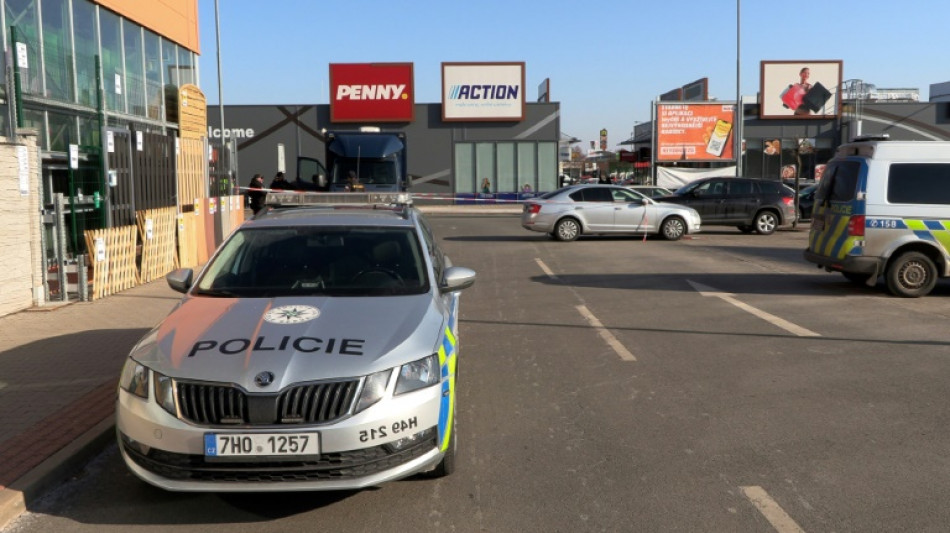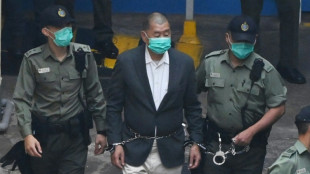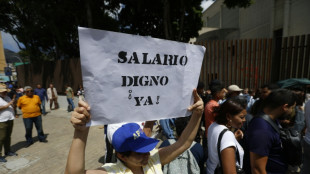
-
 Scotland spoil Italy's T20 World Cup debut with big win
Scotland spoil Italy's T20 World Cup debut with big win
-
Stocks track Wall St rally as Tokyo hits record on Takaichi win

-
 Israeli president says 'we will overcome evil' at Bondi Beach
Israeli president says 'we will overcome evil' at Bondi Beach
-
Munsey leads Scotland to 207-4 against Italy at T20 World Cup

-
 Venezuela's Machado says ally 'kidnapped' after his release
Venezuela's Machado says ally 'kidnapped' after his release
-
Japan restarts world's biggest nuclear plant again

-
 Bangladesh poll rivals rally on final day of campaign
Bangladesh poll rivals rally on final day of campaign
-
Third impeachment case filed against Philippine VP Duterte

-
 Wallaby winger Nawaqanitawase heads to Japan
Wallaby winger Nawaqanitawase heads to Japan
-
Thailand's Anutin rides wave of nationalism to election victory

-
 Venezuela's Machado says ally kidnapped by armed men after his release
Venezuela's Machado says ally kidnapped by armed men after his release
-
Maye longs for do-over as record Super Bowl bid ends in misery

-
 Seahawks' Walker rushes to Super Bowl MVP honors
Seahawks' Walker rushes to Super Bowl MVP honors
-
Darnold basks in 'special journey' to Super Bowl glory

-
 Japan's Takaichi may struggle to soothe voters and markets
Japan's Takaichi may struggle to soothe voters and markets
-
Bad Bunny celebrates Puerto Rico at Super Bowl, angering Trump

-
 Seahawks soar to Super Bowl win over Patriots
Seahawks soar to Super Bowl win over Patriots
-
'Want to go home': Indonesian crew abandoned off Africa demand wages

-
 Asian stocks track Wall St rally as Tokyo hits record on Takaichi win
Asian stocks track Wall St rally as Tokyo hits record on Takaichi win
-
Hong Kong sentences pro-democracy mogul Jimmy Lai to 20 years in jail

-
 Bad Bunny celebrates Puerto Rico in joyous Super Bowl halftime show
Bad Bunny celebrates Puerto Rico in joyous Super Bowl halftime show
-
Three prominent opposition figures released in Venezuela

-
 Japan PM Takaichi basks in historic election triumph
Japan PM Takaichi basks in historic election triumph
-
Israeli president says 'we shall overcome this evil' at Bondi Beach

-
 'Flood' of disinformation ahead of Bangladesh election
'Flood' of disinformation ahead of Bangladesh election
-
Arguments to begin in key US social media addiction trial

-
 Gotterup tops Matsuyama in playoff to win Phoenix Open
Gotterup tops Matsuyama in playoff to win Phoenix Open
-
New Zealand's Christchurch mosque killer appeals conviction

-
 Leonard's 41 leads Clippers over T-Wolves, Knicks cruise
Leonard's 41 leads Clippers over T-Wolves, Knicks cruise
-
Patriots-Seahawks Super Bowl approaches as politics swirl

-
 Trump says China's Xi to visit US 'toward the end of the year'
Trump says China's Xi to visit US 'toward the end of the year'
-
Real Madrid edge Valencia to stay on Barca's tail, Atletico slump

-
 Malinin keeps USA golden in Olympic figure skating team event
Malinin keeps USA golden in Olympic figure skating team event
-
Lebanon building collapse toll rises to 9: civil defence

-
 Real Madrid keep pressure on Barca with tight win at Valencia
Real Madrid keep pressure on Barca with tight win at Valencia
-
Dimarco helps Inter to eight-point lead in Serie A, Juve stumble

-
 PSG trounce Marseille to move back top of Ligue 1
PSG trounce Marseille to move back top of Ligue 1
-
Two prominent opposition figures released in Venezuela

-
 Hong Kong to sentence media mogul Jimmy Lai in national security trial
Hong Kong to sentence media mogul Jimmy Lai in national security trial
-
Lillard will try to match record with third NBA 3-Point title

-
 Vonn breaks leg as crashes out in brutal end to Olympic dream
Vonn breaks leg as crashes out in brutal end to Olympic dream
-
Malinin enters the fray as Japan lead USA in Olympics team skating

-
 Thailand's Anutin readies for coalition talks after election win
Thailand's Anutin readies for coalition talks after election win
-
Fans arrive for Patriots-Seahawks Super Bowl as politics swirl

-
 'Send Help' repeats as N.America box office champ
'Send Help' repeats as N.America box office champ
-
Japan close gap on USA in Winter Olympics team skating event

-
 Liverpool improvement not reflected in results, says Slot
Liverpool improvement not reflected in results, says Slot
-
Japan PM Takaichi basks in election triumph

-
 Machado's close ally released in Venezuela
Machado's close ally released in Venezuela
-
Dimarco helps Inter to eight-point lead in Serie A


Peaceful Czechs grapple with youth violence
When a 13-year-old boy pointed a gun at his teacher in a Czech school in January, she kept cool and slowly cornered him to let his classmates escape.
Police said she did everything right, using recent security training put in place as alarm has grown about bullying, attacks and even murders committed by schoolchildren.
"Violence and youth mental problems are growing dramatically at Czech schools," the education ministry said in a document sent to schools earlier this year to help them cope with potential dangers.
While experts warn that little data on youth violence across Europe exists, it has started to make headlines regularly in the central European country that ranks 12th safest on the Global Peace Index.
The index takes into account conflicts and militarisation but also levels of perceived criminality and number of homicides.
Even "within Europe, we are a peaceful country", sociologist Martin Buchtik told AFP.
He cited "indifference to religion", ethnic homogeneity, a "functioning social system" and a general distaste for "radical solutions" as factors that generally keep Czechs cool.
- Frightening attacks -
Since a student killed 14 people and wounded 25 at Prague's Charles University in December 2023 in a shooting that shocked the nation, Czech schools have stepped up prevention programmes and cooperation with the police.
But cases keep coming up.
Last month, a 16-year-old boy stabbed two shop assistants to death with a knife he picked up on a shelf in an apparently random attack.
Also in February, police charged a 15-year-old boy who threatened to open fire at an elementary school in a northern city.
And within five days in January, police detained 10 minors suspected of attempting or plotting attacks at schools across the country of 10.9 million people.
Minors committed 1,080 violent crimes including 10 murders in 2024, police statistics show, a sharp growth from 701 violent crimes and seven murders in 2022.
The number of juvenile delinquents in the EU country has grown by 26 percent from 2019 to 2024.
Likewise in neighbouring Austria as well as in Slovenia, which also rank high on the global peace index, youth crime statistics show a rise.
This is in part due to increased awareness which has led to a rise in reporting, as well as more types of offences being recorded, authorities say.
- Quarter 'feel no joy' -
Jan Zufnicek, a psychologist at the Prague-based Primary Prevention Centre, said in a podcast recently that "more than half of Czech children do not have an adult at school that they would confide in."
He said mental disorders among children were on the rise, fuelled by the Covid-19 pandemic and lockdowns.
A poll of over 10,000 children conducted by the Anreva Solution agency in Prague last year showed many children are battling depression, anxiety and a low sense of well-being.
More than a quarter of pupils polled felt no joy in life.
Forensic psychologist Ludmila Cirtkova blames "an accumulation of several unfavourable factors", saying young delinquents suffered from a lack of functioning relationships.
Cirtkova added the consumption of violence on the internet played a role too, a view echoed by the education ministry which blames "a massive spread" of digital technologies and social media.
Cirtkova sees a way out in "good relationships between educators and children".
"But it takes time and energy to show interest in the joys and worries of children," she added.
"If every part of the child socialisation system fulfils its role, I suppose the tragic cases of violent attacks will be absolutely rare."
Legal philosopher Theo Gavrielides, who works on youth violence prevention, also said young people should not be demonised.
"Young people and teenagers are in the state of development, hence there are a lot more things that can be done to prevent violence," he added.
N.Awad--SF-PST




